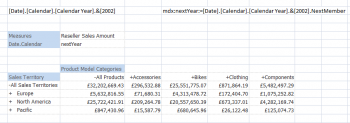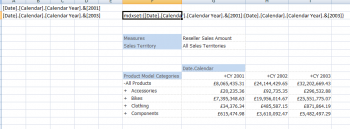Difference between revisions of "Mdx:"
(added categories) |
|||
| Line 46: | Line 46: | ||
==See also== | ==See also== | ||
* [[XL3Member#XL3Member using MDX|MDX: in XL3Member formulae]] | * [[XL3Member#XL3Member using MDX|MDX: in XL3Member formulae]] | ||
| + | * [[Calculations Overview]] | ||
| + | * [[MDX Calculations]] | ||
[[Category:Grid Reporting]] | [[Category:Grid Reporting]] | ||
[[Category:OLAP Operations]] | [[Category:OLAP Operations]] | ||
Revision as of 17:58, 28 November 2013
Contents
[hide]Description
The Mdx: or Mdx Colon feature allows you to easily combine snippets of Mdx with your existing XLCubed Grids and other report objects.
The Mdx: statement could be a fixed piece of text, or created by using an Excel formula.
You can use this to create members or sets depending on your requirements.
Syntax
The Mdx: statement is made up of two or three parts.
| Part | Optional? | Description |
|---|---|---|
| Mdx: or MdxSet: | No | Select based on whether your mdx snippet returns a single member or a set of members. |
| Caption:= | Yes | Puts a user friendly caption against the member when it is returned. |
| Mdx | No | The Mdx snippet to run. |
Examples
Valid examples you be:
- Mdx:nextYear:=[Date].[Calendar].[Calendar Year].&[2002].NextMember
- Mdxset:{[Date].[Calendar].[Calendar Year].&[2001]:[Date].[Calendar].[Calendar Year].&[2003]}
In these examples the Mdx: statement is made using other Excel references, so that when these change the grid will also be updated.

